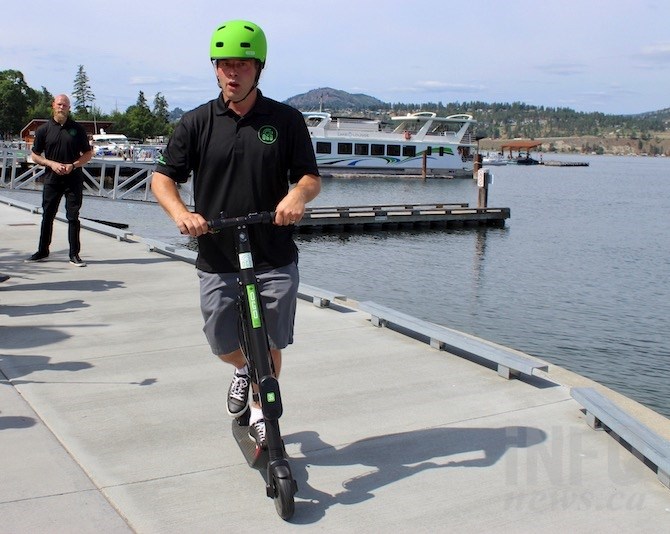E-scooters in downtown Kelowna are safer than some councillors think
Kelowna city councillors have raised safety concerns about the plan for a rollout of e-scooters and e-bikes this week.
Council was presented with an updated version of the city's Micromobility plan, Feb. 26, which included a request from the Downtown Kelowna Association to allow shared e-scooters on the roads during this summer's Meet Me on Bernard outdoor pedestrian zone.
Councillor Maxine Dehart said she and her family spend a lot of time downtown in the summer and that she's not convinced that allowing e-scooters on Bernard Avenue during that time is wise.
READ MORE: New rules and four year extension for e-scooters in Kelowna
As a result, city staff recommended a speed restriction of 15 km/h, which is slower than most pedal bicycles.
E-scooters and e-bikes will also be banned from sidewalks and fitted with sidewalk-detection technology. Dehart said 15 km/h is still "pretty fast" and could cause a safety issue when streets are congested.
"We try to encourage pedestrians walking and that's one reason why we're closing Bernard," she said.
Councillor Luke Stack requested an amendment to not allow e-scooters on Bernard during this busy time of year.
READ MORE: E-scooter use in Kelowna and Vernon skyrocketed in 2023
"The province came out with an experimental program to allow e-scooters to operate on streets much like a motor vehicle because they are a motorized vehicle," Stack said. "So we changed all out laws to allow them to ride like vehicles. So, then to turn around and now say OK, we're going to take a pedestrian zone... and make that also a vehicle street. It just doesn't seem consistent."
City transportation planner Cameron Noonan told iNFOnews.ca e-scooters are not a uniquely dangerous way of getting around, although intoxicated riding is a serious concern.
To address this, downtown will be a designated no-ride area after 10 p.m. and users in other parts of the city will have to complete a cognitive test before starting an e-scooter after 10.30 p.m.
That test will take the form of a puzzle or reaction time test on the rider's phone that they must pass before using the e-scooter.
The plan was carried by council and will now move onto the next stage of finding an operator.
A single operator will be contracted for two years by the city to operate 700 e-scooters and 300 e-bikes.
READ MORE: B.C. launching four-year study on how e-scooters fit into transport system
According to Noonan, one the most common concern expressed by the community is that e-scooters and e-bikes will block sidewalks.
As part of the new plan, riders will not be able to end their rental until they reach the newly designated downtown parking areas.
“People will not be able to end their rental and their trip until they're at one of those designated spaces,” Noonan said. “And that will help cut down on some of the blocking of sidewalks and just the general tidiness that we've heard from the community.”
Noonan is also convinced the public will benefit from the e-scooter campaign at little to no cost.
“This shared micromobility is providing a significant amount of low-carbon, sustainable mobility at no cost to taxpayers,” Noonan said. “The usage of the service is equivalent to one-quarter of our public transit ridership in peak months.”
— This story was updated at 11:50 a.m. Wednesday, Feb. 28, 2024, to correct a typo in a quote.
To contact a reporter for this story, email Georgina Whitehouse or call 250-864-7494 or email the editor. You can also submit photos, videos or news tips to the newsroom and be entered to win a monthly prize draw.
We welcome your comments and opinions on our stories but play nice. We won't censor or delete comments unless they contain off-topic statements or links, unnecessary vulgarity, false facts, spam or obviously fake profiles. If you have any concerns about what you see in comments, email the editor in the link above. SUBSCRIBE to our awesome newsletter here.




